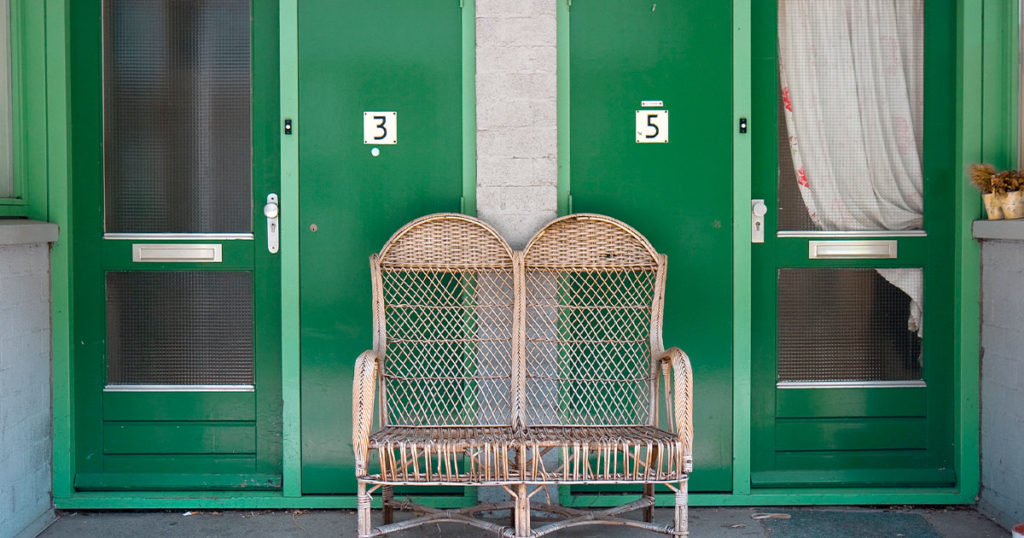
The old woman dozing in her chair woke up a moment after I, sitting at her side, had also awakened. Perhaps her movements as she resurfaced from sleep had brought me to, or perhaps it was the rumble of a neighbor’s gate rolling open. However it had happened, I was back in the world of that Saturday morning, with its alternating cloud and sun, enlivened by a few spatters of rain. It was by then noon. How sleepy I am, she said in Spanish, and I said I was sleepy too, and we both laughed. She cocked her head as if listening. We were on the glassed-in porch, which was full of light and well warmed, even though the sunshine was intermittent. But behind us in the house all was dim and silent. No one’s here? she asked, looking slightly perplexed. Just us, I told her.
In part because I know her short-term memory often fails her, in part just to share some words with her, and in part to signal that, old and marginalized as she is, she deserves to know the particulars of the situation she finds herself in—for all those reasons I did a rundown of where everyone was. Her daughter-in-law, granddaughter, and great-granddaughter were away in Jerez de la Frontera for a week; her son was in a nearby town for the morning, tending the orchard there; and her daughter was still in Madrid visiting her daughter and the two grandkids. For now, it was the two of us at the house. Holding down the fort, I’d have said in English, but I didn’t know how to say it in Spanish. “Just the two of us,” I repeated.
The old woman shivered and said it was cold, and I agreed that the gathering clouds did make a difference. I put a blanket across her lap, rubbed her shoulders, and again thought it was incredible that someone with nothing to do all day but sit in her chair, eat the three meals brought to her, ask from time to time to be wheeled to the bathroom and then be wheeled back—how a person in such a state could appear so calm and accepting. No TV, no books, no conversation from family, no visits, no landscapes to contemplate, no pets to snuggle in her lap. This week no great-grandchild running in and out. But even with others coming and going in the house, she was essentially alone. What filled her mind all day? Her son or daughter-in-law turned on the radio on the table for her every morning, but when I was with her and asked if she wanted it, she always said no.
“Are you thinking?” I’d asked the first day I attended her, stepping in to help when the family suddenly found themselves short a caretaker. I really wanted to ask her what she was thinking, but asking about the content of her mind seemed more intrusive than merely wondering what she was doing with it. She’d nodded. That’s all I do, she’d said, though without any tone of complaint or lamentation about not doing more. “Of the past?” I’d said, and she’d answered yes, what else? The future she knew.
My mind had jumped to a student. Just two days earlier in class, when asked if she’d rather lose an arm or a leg, this high school student had answered that she’d rather die. Her partner in a speaking exercise I’d assigned was incredulous. “No, really,” she assured her partner. She was the best student in that class and also a girl who liked to stir things up, confound expectations. Live fast and die young, she said, turning her head toward me. I had come to crouch at her side for a moment to hear her words, and I agreed one could aspire to a short and intense life rather than to hang on in reduced circumstances. “Fast and furious,” she said. “That’s one way, certainly,” I admitted.
The other students said they’d prefer to lose an arm. They could still eat and get dressed with one hand, but without a leg you’d be in a wheelchair. Even when prosthetic limbs were mentioned, the students stuck by their choice. No other student, however, had suggested the firebrand’s radical third choice, as I pointed out to the class when we tallied up the answers. The other students looked at her. She’d rather go when young and beautiful, she explained to them, not wait until she was old and wrinkled. I nodded. So it wasn’t the loss of a body part she’d regret, but the loss of youth. I wondered if she knew the idiom to give an arm and a leg. I wanted to ask her if she’d give either to keep her youth, but the opportunity never came.
On the warm porch while the sun tussled with the clouds outside, I thought again of that student and her eyes crinkled in amusement as she as good as claimed that she’d give her life to not lose her youth. The thing about youth, though, is that, once it’s gone, it no longer seems as essential as when you still possessed it. Something else takes its place. Maybe the old woman felt the same about losing her hold on the world. Could that account for her sublime calm? Her acceptance? She wouldn’t balk at the choice between arm and leg, I felt sure, but likely claim she needed neither. But who knows? Maybe, like my brazen student, she’d rather die.
The sun emerged again. I turned the radio on low. “Cuéntame,” a Spanish pop song from the ’60s, was playing. Then a song from my own youth: “Words Don’t Come Easy.” That was a fitting phrase to drift off to, the two of us dozing on the porch like a pair of cats, each in our own armchair. Words don’t come easy, but sleep does.


